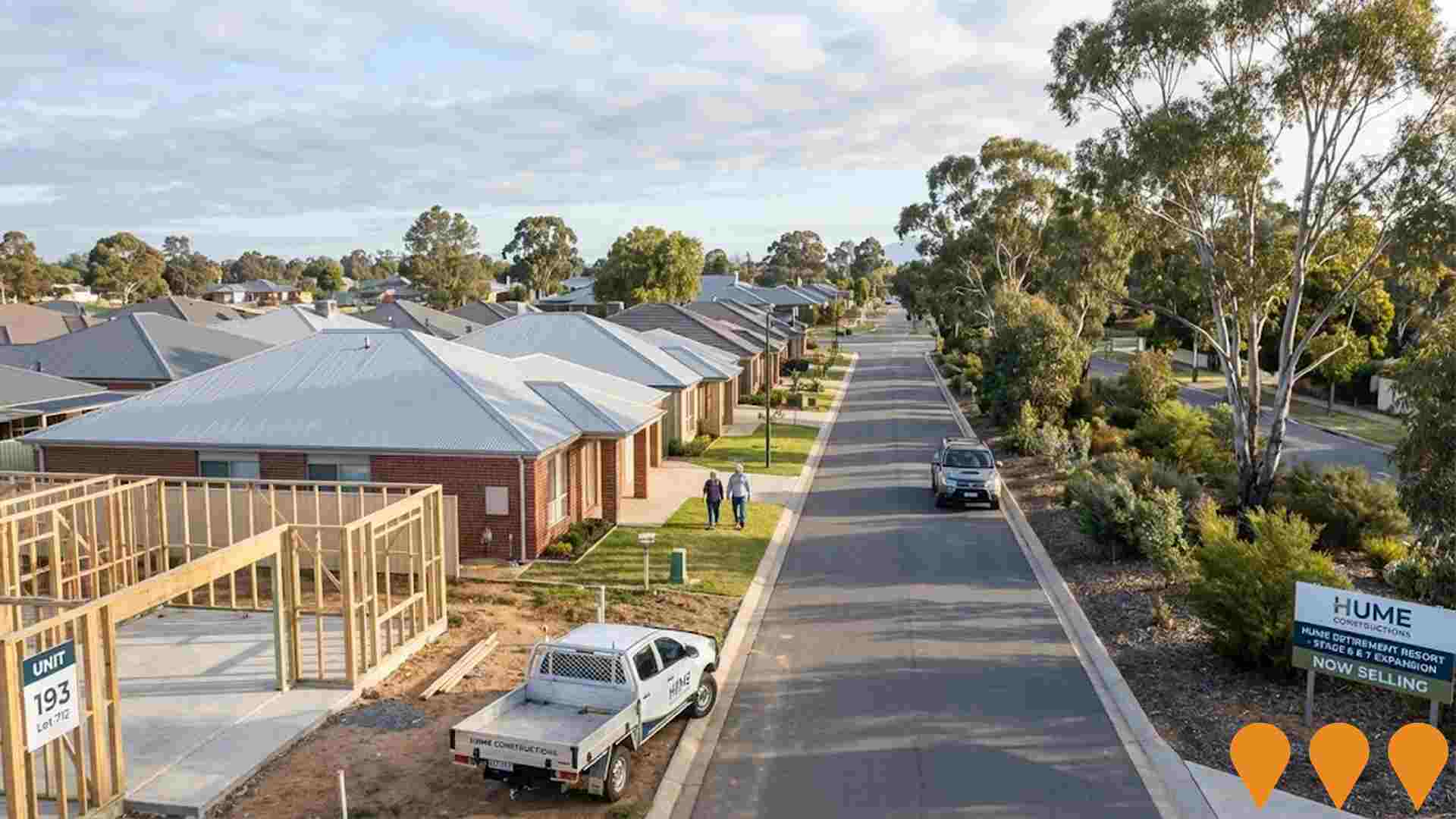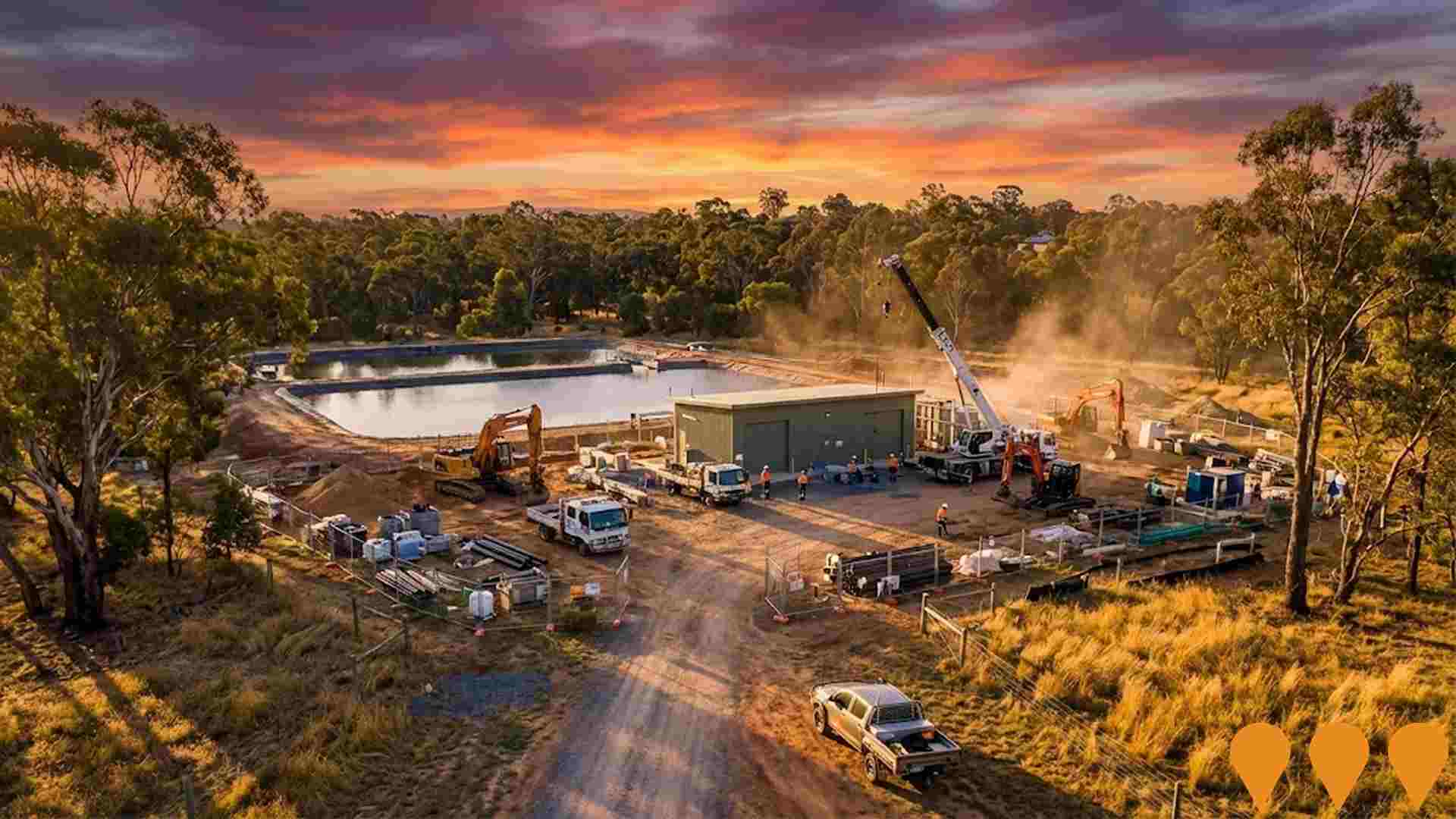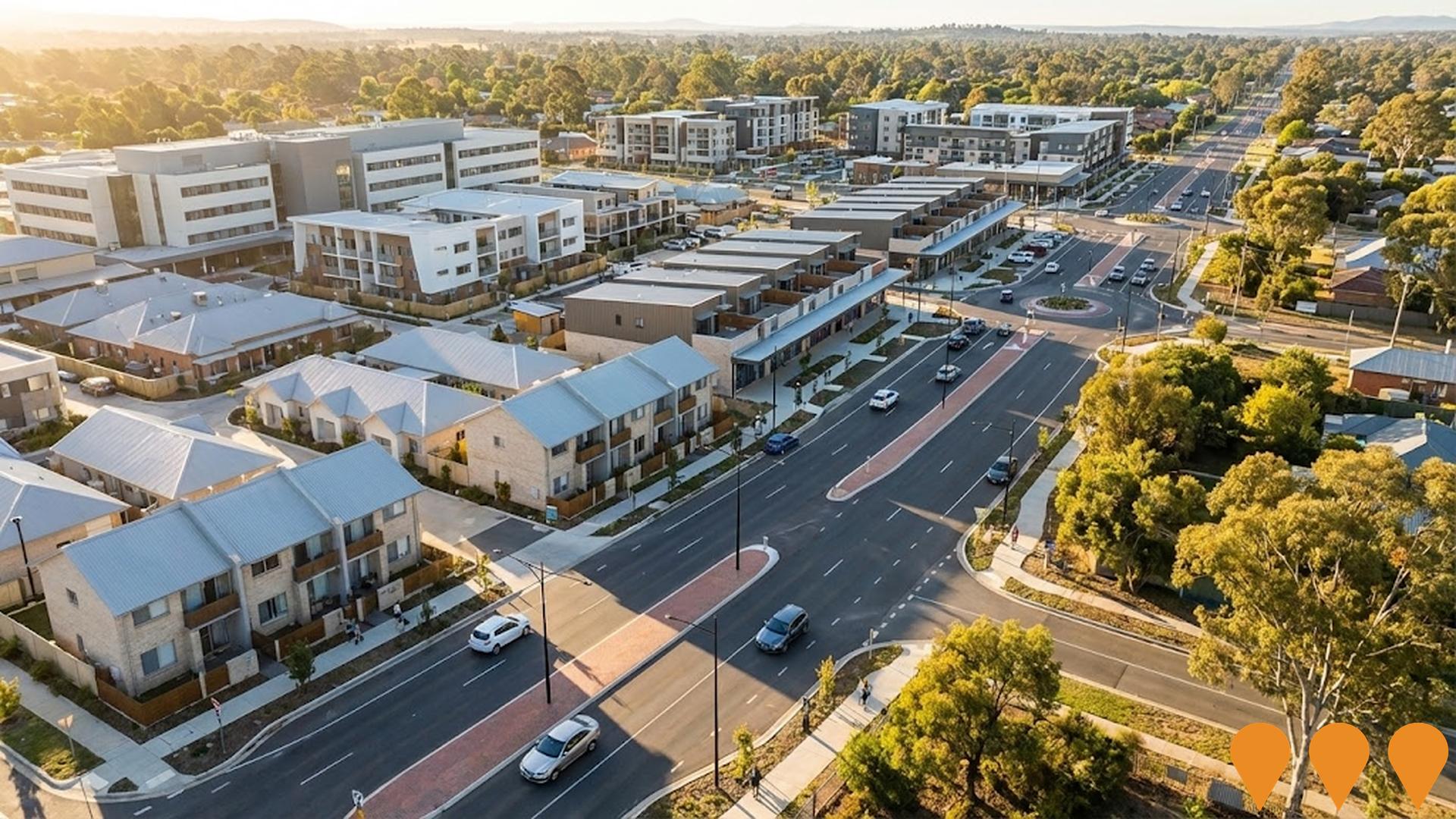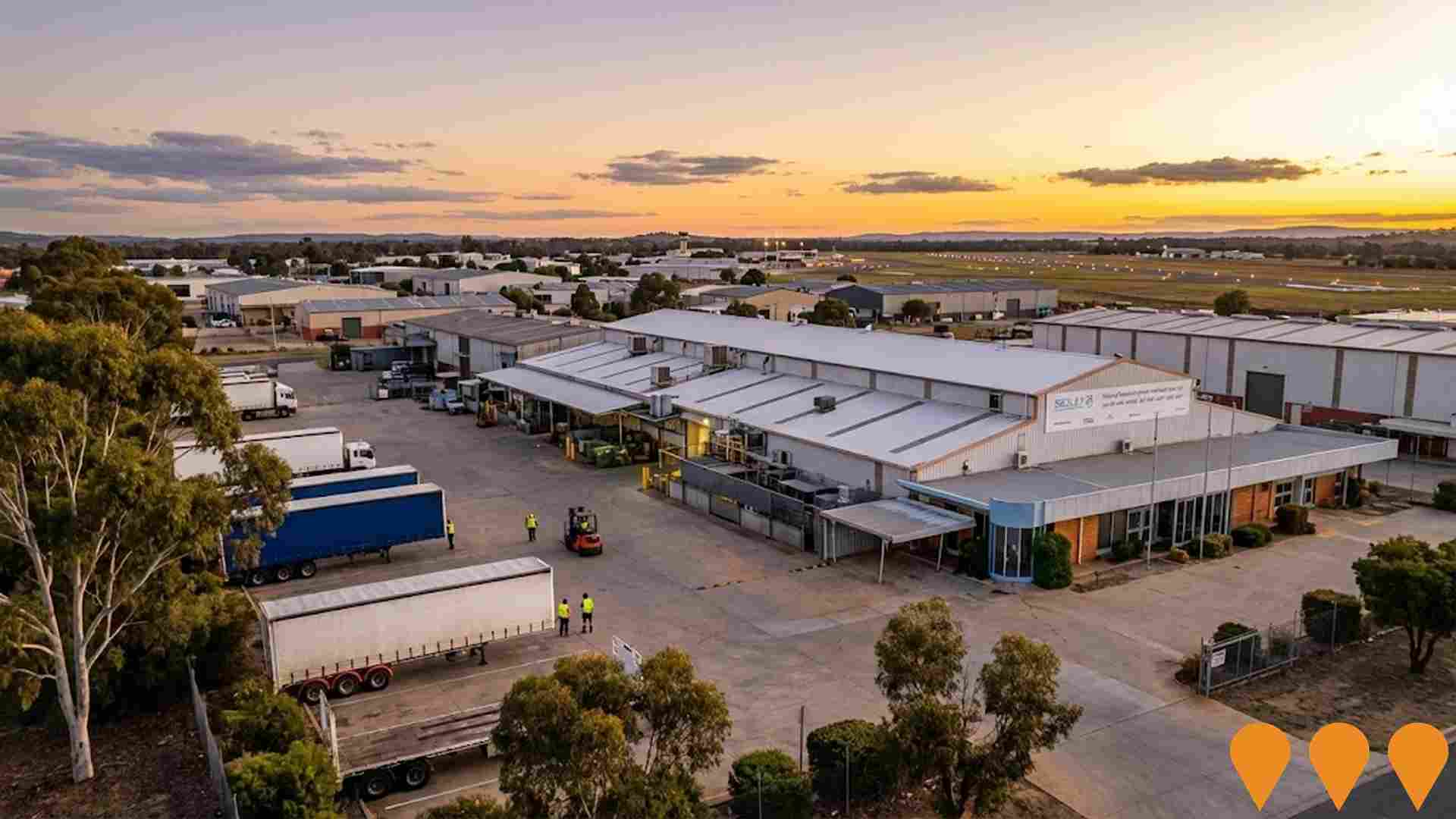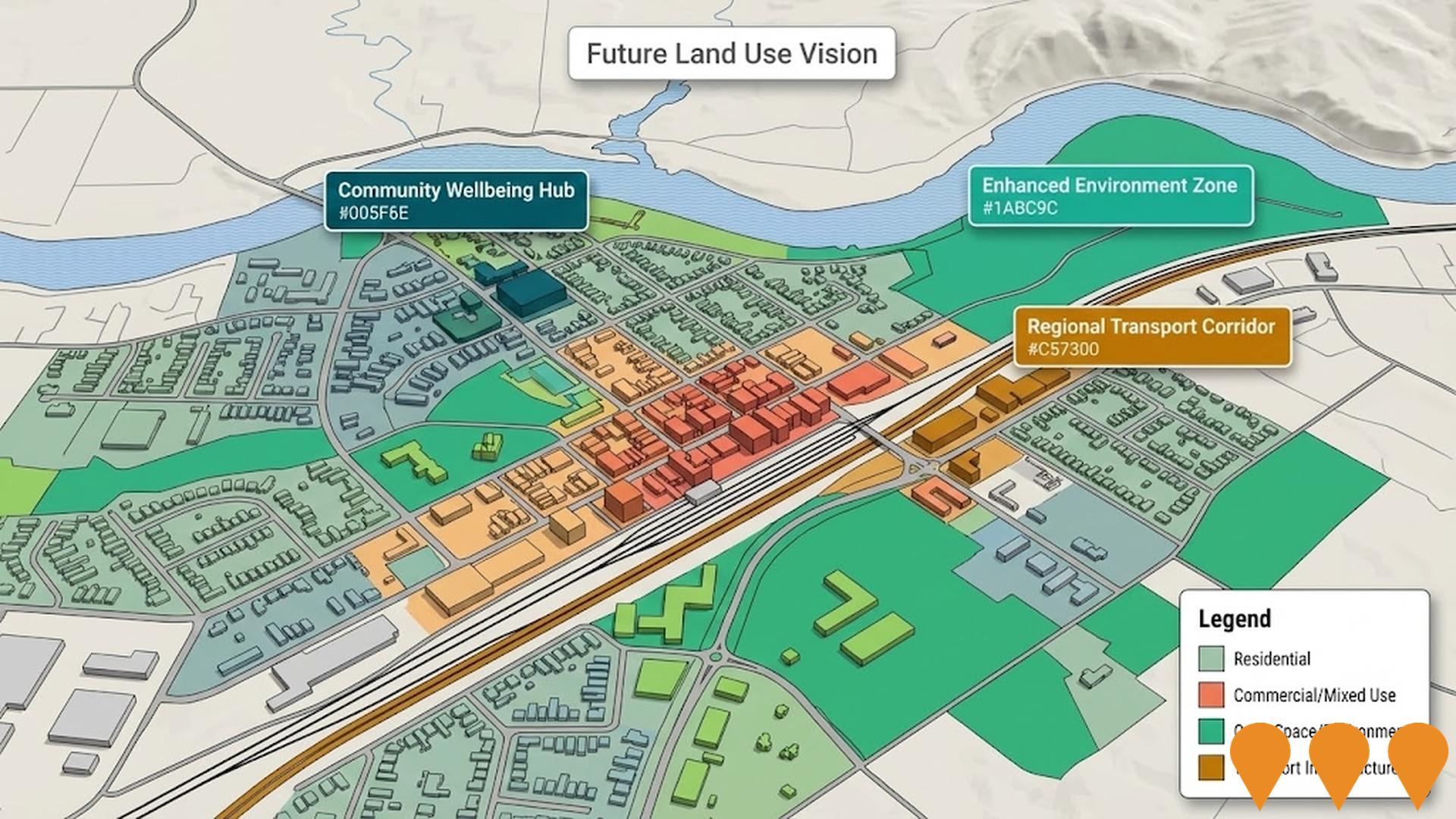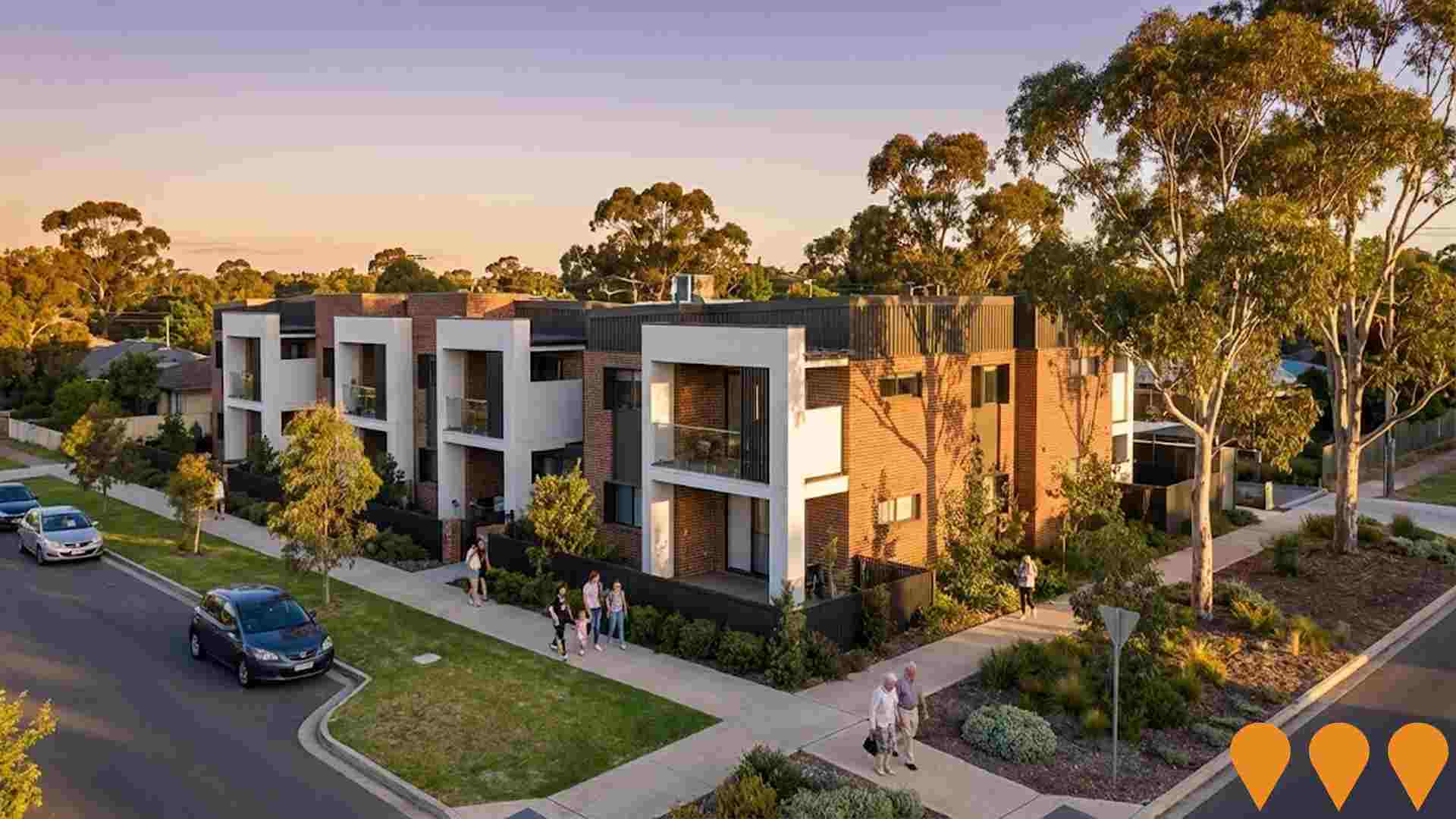Chart Color Schemes
This analysis uses ABS Statistical Areas Level 2 (SA2) boundaries, which can materially differ from Suburbs and Localities (SAL) even when sharing similar names.
SA2 boundaries are defined by the Australian Bureau of Statistics and are designed to represent communities for statistical reporting (e.g., census and ERP).
Suburbs and Localities (SAL) represent commonly-used suburb/locality names (postal-style areas) and may use different geographic boundaries. For comprehensive analysis, consider reviewing both boundary types if available.
est. as @ -- *
ABS ERP | -- people | --
2021 Census | -- people
Sales Activity
Curious about local property values? Filter the chart to assess the volume and appreciation (including resales) trends and regional comparisons, or scroll to the map below view this information at an individual property level.
Find a Recent Sale
Sales Detail
Population
Population growth drivers in Albury - North are strong compared to national averages based on AreaSearch's ranking of recent, and medium to long-term trends
Albury - North's population is approximately 10,828 as of November 2025. This represents an increase of 301 people, a 2.9% rise from the 2021 Census figure of 10,527. The growth is inferred from ABS data showing an estimated resident population of 10,605 in June 2024 and 147 new addresses validated since the Census date. This results in a population density of 448 persons per square kilometer. Albury - North's growth rate places it within 2.2 percentage points of non-metro areas (5.1%), indicating strong growth fundamentals. Overseas migration contributed approximately 58.0% of overall population gains.
AreaSearch uses ABS/Geoscience Australia projections for each SA2 area, released in 2024 with a base year of 2022, and NSW State Government's SA2 level projections for areas not covered by this data, released in 2022 with a base year of 2021. Growth rates by age group are applied to all areas from 2032 to 2041. By 2041, the area is forecasted to increase by 2,578 persons, reflecting a total gain of 21.8% over the 17-year period.
Frequently Asked Questions - Population
Development
Residential development activity is lower than average in Albury - North according to AreaSearch's national comparison of local real estate markets
Albury - North has seen approximately 41 new homes approved annually. Over the past five financial years, from FY21 to FY25, around 205 homes were approved, with an additional 22 approved so far in FY26. On average, about 0.8 new residents have arrived per year for each new home over these five years, indicating that supply is meeting or exceeding demand and providing more buyer choices while supporting potential population growth above projections.
The average construction cost of new homes has been around $266,000, which is below regional norms, reflecting more affordable housing options. In FY26, there have been approximately $13.6 million in commercial approvals, indicating steady commercial investment activity in the area. Compared to the rest of NSW, Albury - North has about half the rate of new dwelling approvals per person and places among the 54th percentile nationally when assessed against other areas.
The majority of new development consists of detached houses (86.0%) with a smaller proportion of attached dwellings (14.0%), preserving the area's low-density nature and attracting space-seeking buyers. There are approximately 296 people per dwelling approval, further indicating a low-density market in Albury - North. Future projections estimate that Albury - North will add around 2,355 residents by 2041, based on the latest AreaSearch quarterly estimate. If current development rates continue, housing supply may not keep pace with population growth, potentially increasing competition among buyers and supporting stronger price growth in the area.
Frequently Asked Questions - Development
Infrastructure
Albury - North has moderate levels of nearby infrastructure activity, ranking in the 42ndth percentile nationally
The performance of an area is significantly influenced by changes in local infrastructure, major projects, and planning initiatives. AreaSearch has identified a total of 31 projects that are expected to impact the area. Notable projects include the Glenroy Aboriginal Affordable Housing Project, Hume Retirement Resort - Unit 193 (Lot 712) Dwelling & Garage, Lavington Swim Centre Redevelopment, and Albury Wodonga Regional Hospital Redevelopment. The following list details those projects likely to be most relevant.
Professional plan users can use the search below to filter and access additional projects.
INFRASTRUCTURE SEARCH
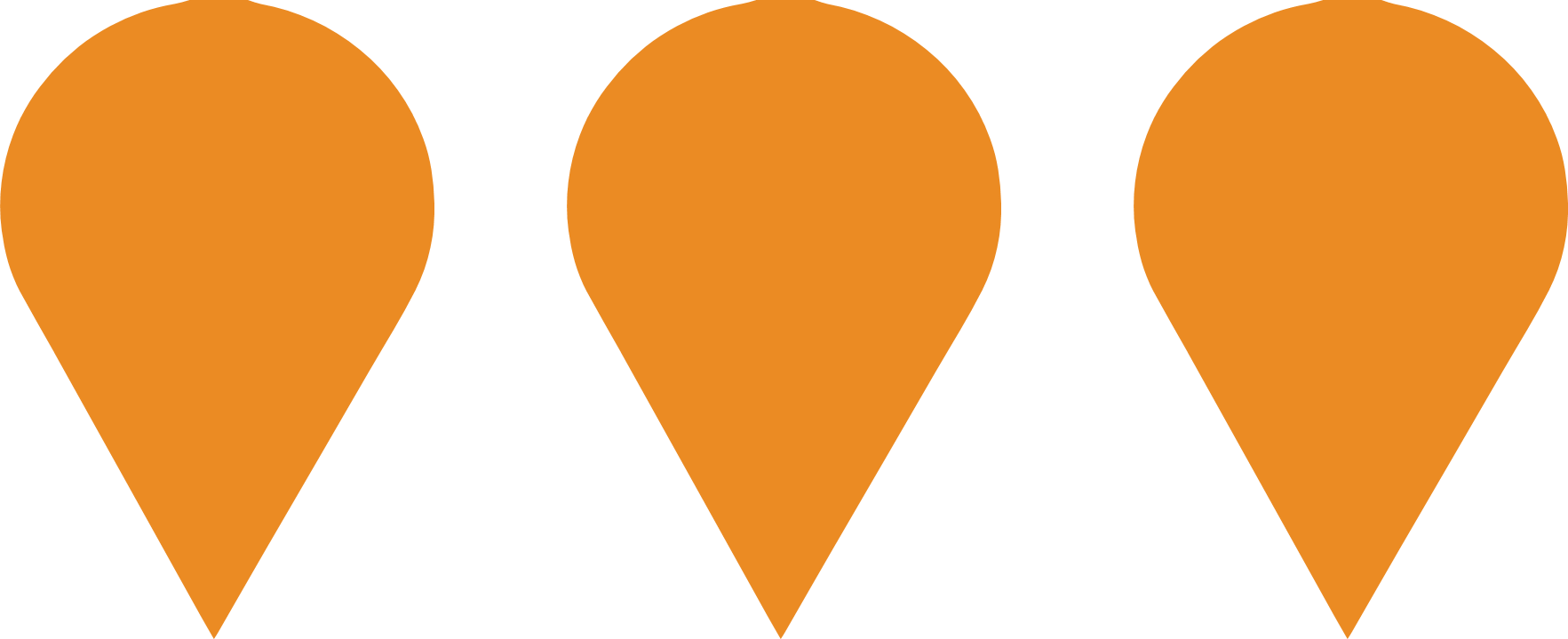 Denotes AI-based impression for illustrative purposes only, not to be taken as definitive under any circumstances. Please follow links and conduct other investigations from the project's source for actual imagery. Developers and project owners wishing us to use original imagery please Contact Us and we will do so.
Denotes AI-based impression for illustrative purposes only, not to be taken as definitive under any circumstances. Please follow links and conduct other investigations from the project's source for actual imagery. Developers and project owners wishing us to use original imagery please Contact Us and we will do so.
Frequently Asked Questions - Infrastructure
Glenroy Aboriginal Affordable Housing Project
Development of approximately 200 affordable housing units and industrial facilities on an 81,000 sqm block for the Aboriginal community, supported by a $590,000 grant. The project remains stalled due to native title issues and has not progressed past the proposed stage. There is no publicly available update suggesting the native title issues have been resolved as of October 2025. The developer continues to operate various community services.
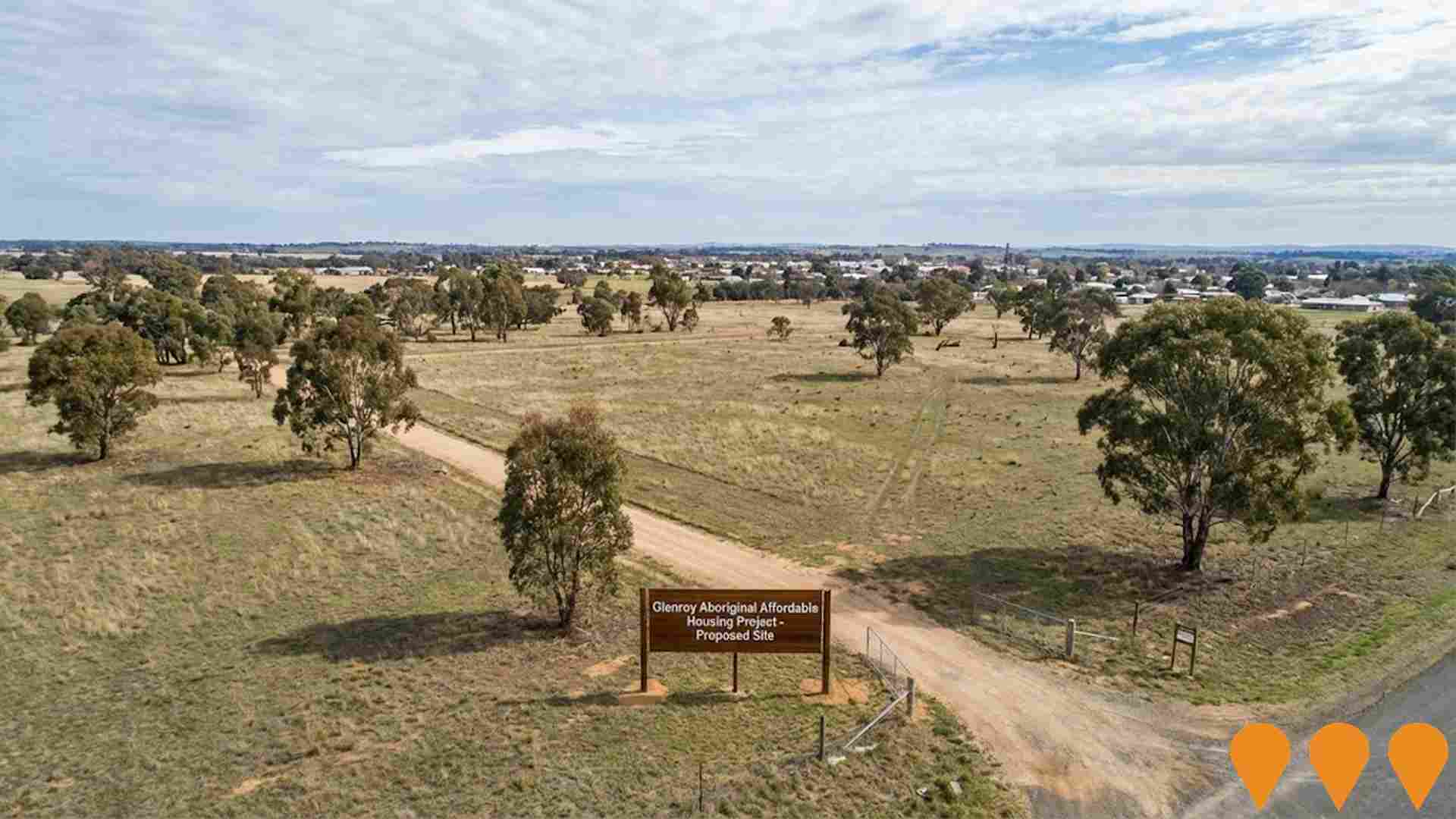
Albury Wodonga Regional Hospital Redevelopment
AUD 558 million joint NSW-Victorian-Commonwealth funded redevelopment of Albury Wodonga Health (Albury Campus). Delivering a new 7-storey Clinical Services Tower and separate Northeast Building. Key features include 80+ additional beds, expanded emergency department, new operating theatres (including hybrid theatre), expanded ICU, new 32-bed adult mental health unit, upgraded maternity and special care nursery, dedicated paediatric unit, and consolidated cancer services. Construction commenced early 2025 by Hansen Yuncken; Northeast Building due for completion 2026, main Clinical Services Tower 2028.
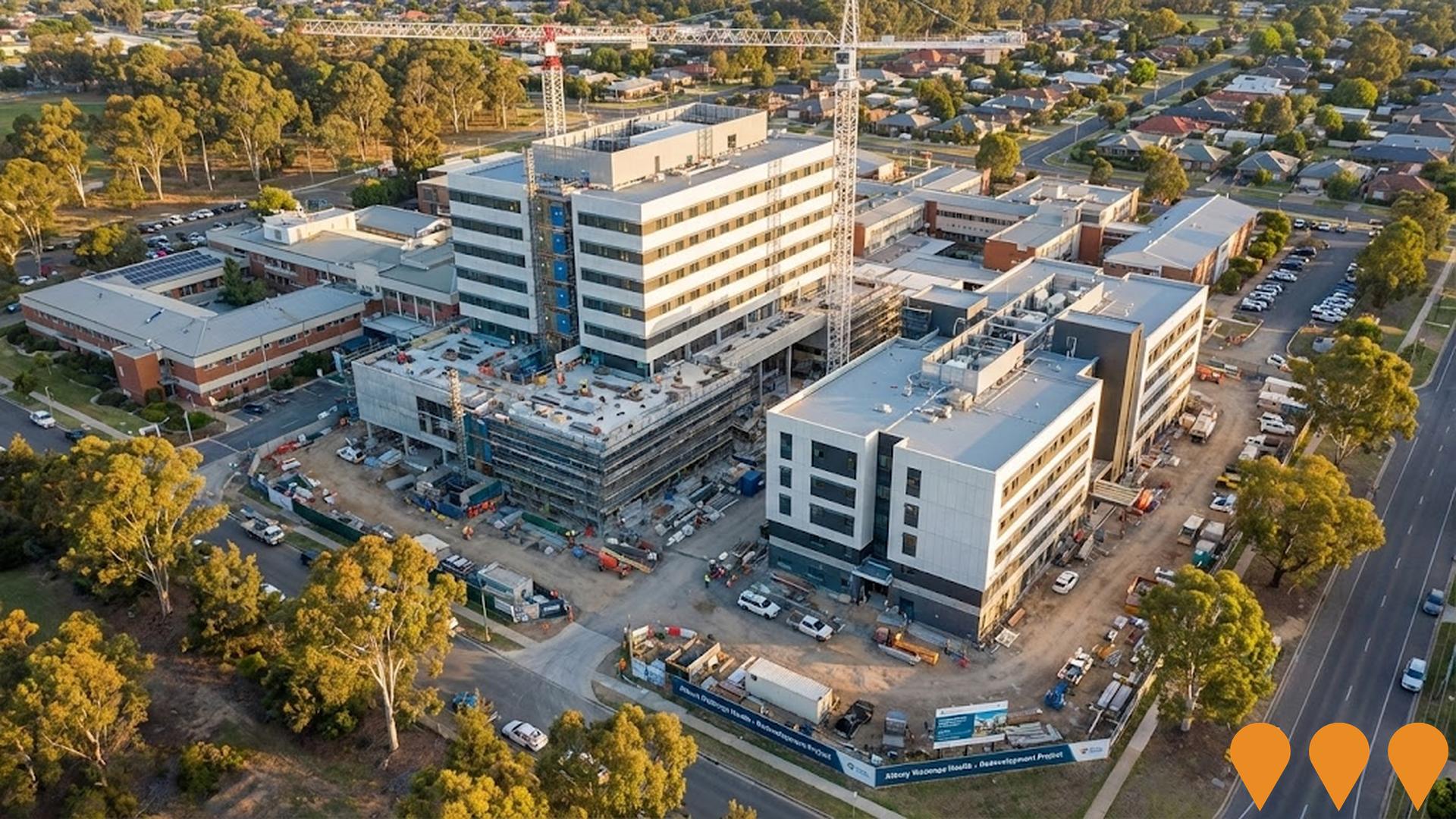
Lavington Swim Centre Redevelopment
The $45.1 million redevelopment (Stage 3) of the Lavington Swim Centre includes a 10-lane 50-metre competition pool, a dedicated 35-metre x 25-metre water polo pool with uniform 2-metre depth, a 25-metre x 15-metre utility pool for lap swimming and remedial use, a splash pad for interactive water play, a new pool building with administration, kiosk, change rooms, amenities, and a Changing Places facility, a flexible multi-purpose social room, and shaded arbour structures with seating, BBQ, and picnic areas. The project replaces the 1967 facility at the end of its service life, aiming to provide modern, inclusive, and accessible aquatic facilities. Stage 3 was endorsed by Council in May 2025 following community consultation, with detailed design underway with Canvas Projects and construction planned to commence in 2027.
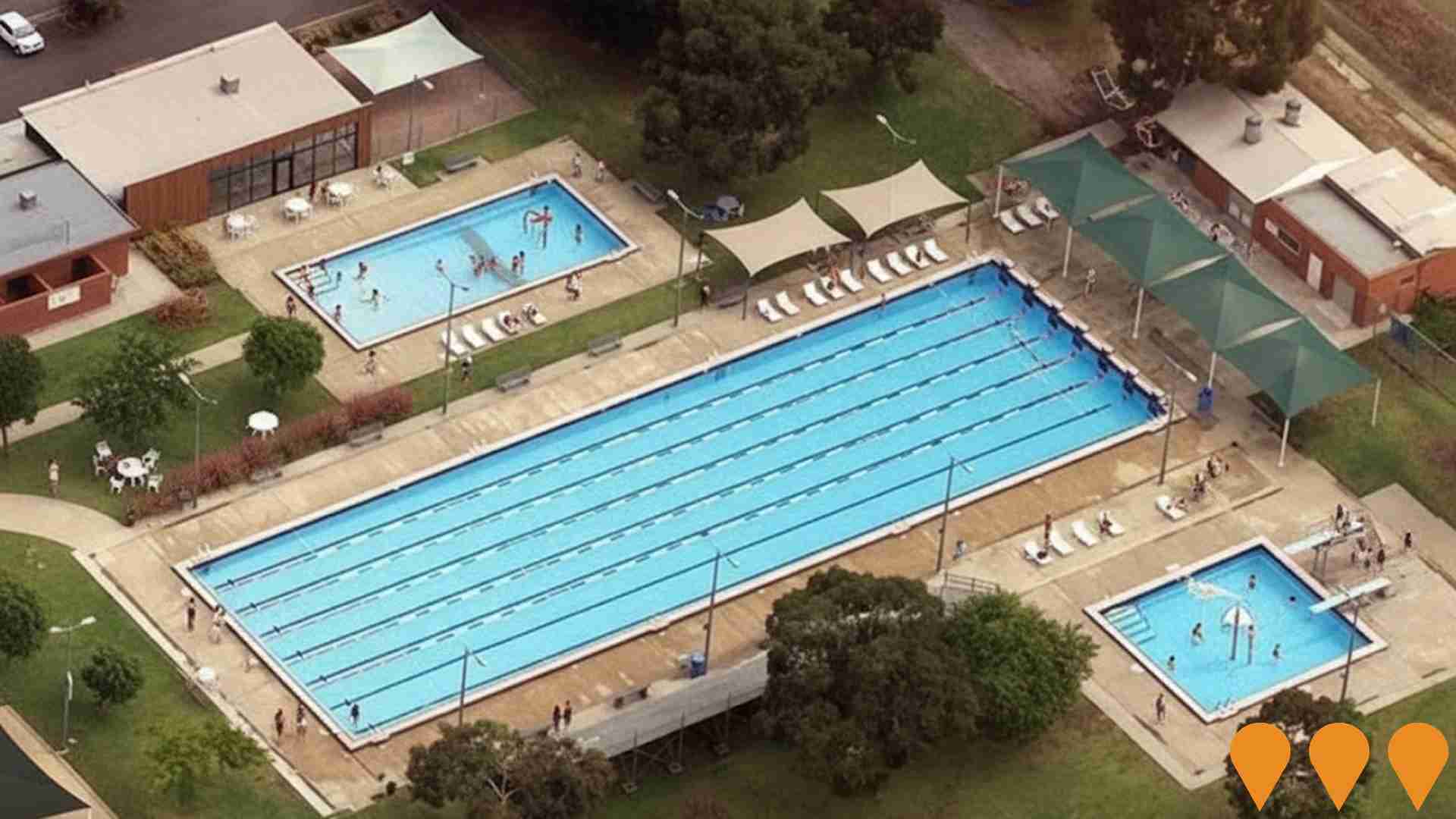
Lavington Square Shopping Centre Upgrades
The Reimagining Lavington project involves upgrading the Lavington Square Shopping Centre with a new food court, refreshed fresh food precinct, new play area, upgraded lighting, modern aesthetics, interactive play zones, refreshed car parks, improved wayfinding, and remodelled amenities to enhance the customer experience and serve the growing community.
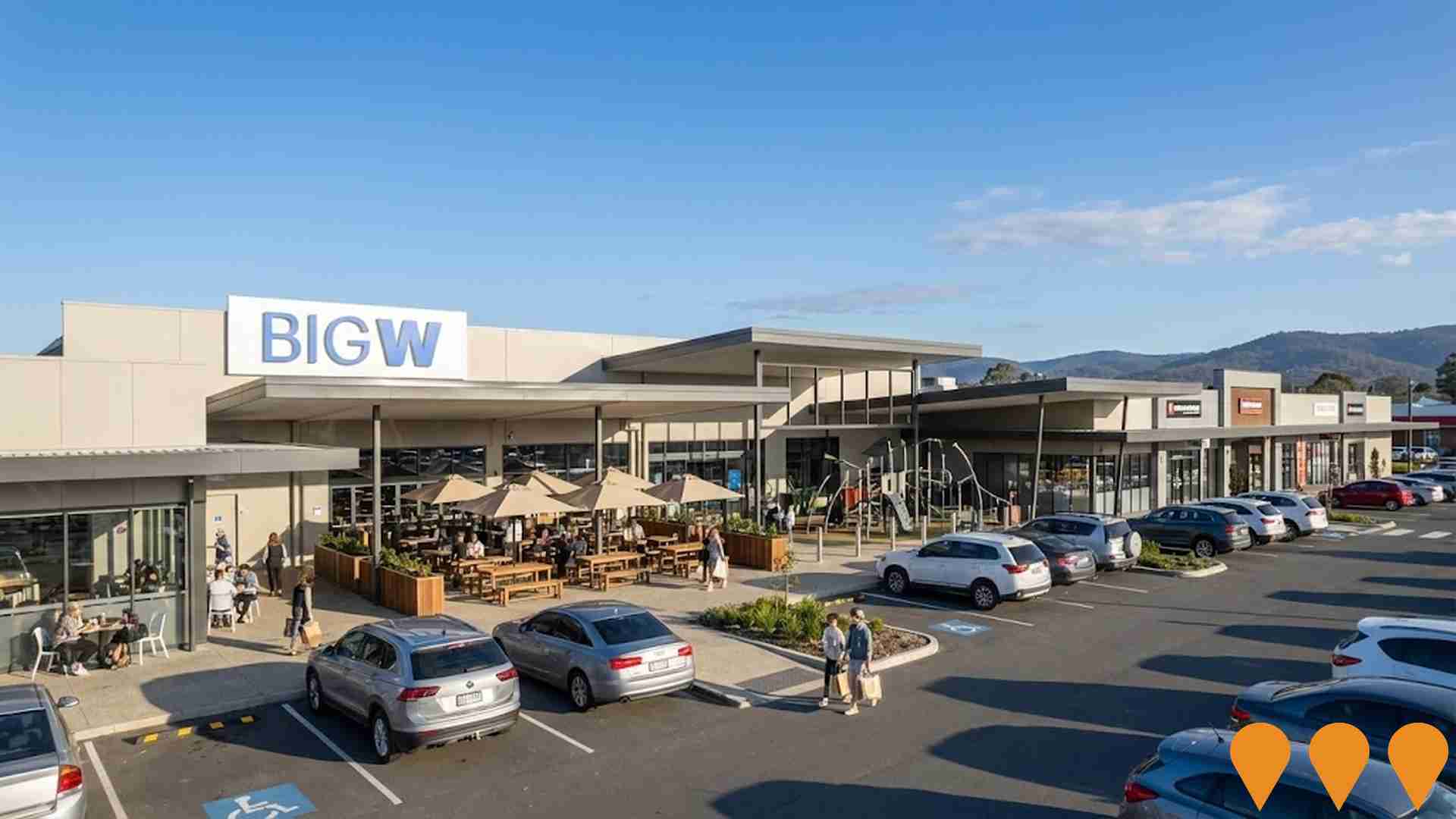
Lavington Social Housing Project
A $5 million Social Housing Accelerator Fund development delivering 10 new three-bedroom homes specifically designed for women-led families, particularly those escaping domestic and family violence. At least 10% of homes are allocated to Aboriginal women, with tenants selected from the social housing register. The development features gender-responsive design principles focused on safety, security, and family-friendly layouts.
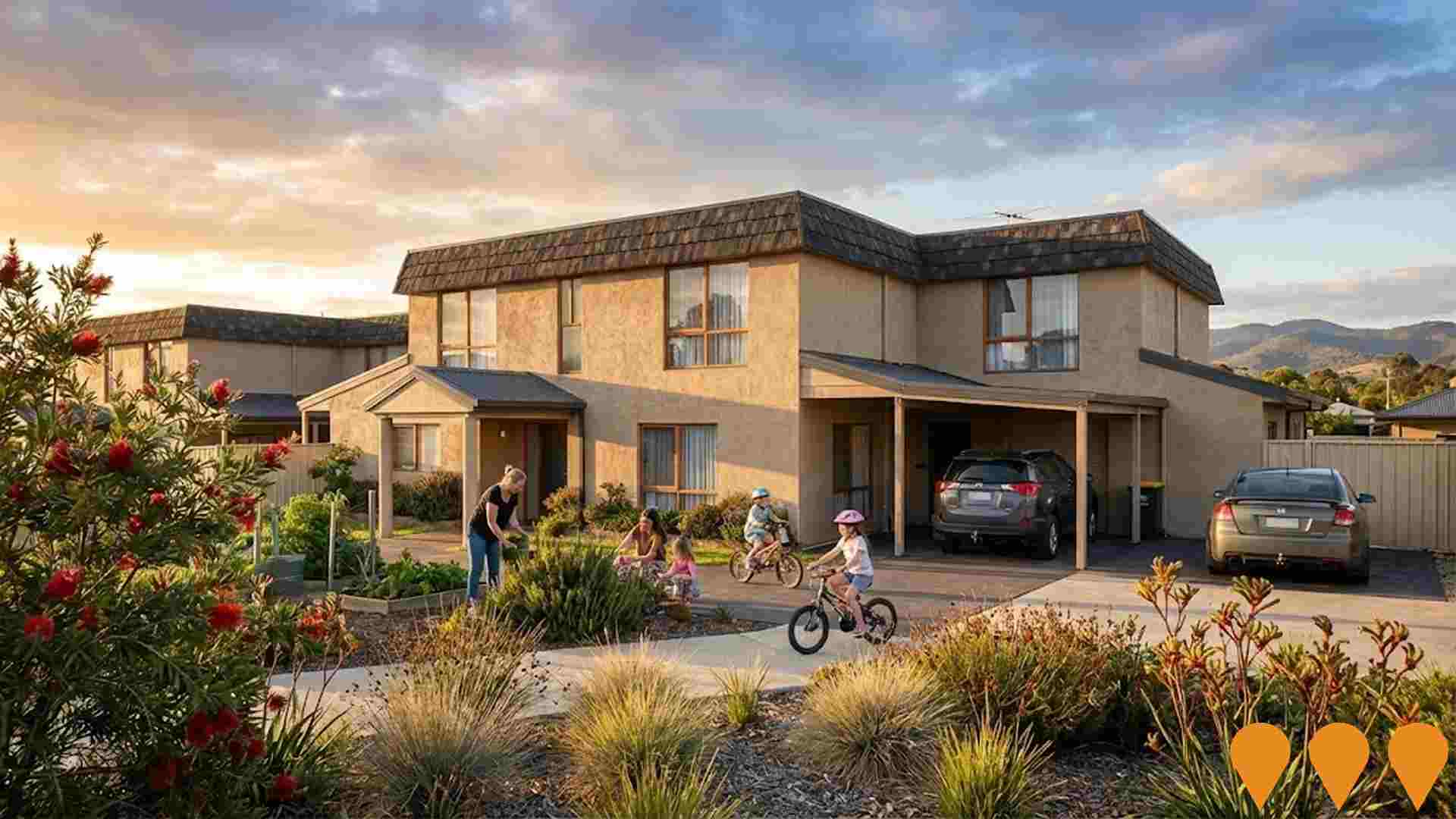
Bright Steps Academy Lavington
DA approved 136-place childcare centre with Agreement for Lease (AFL) to Bright Steps Academy. Single-level development with at-grade parking for 35 vehicles on 3,617 sqm R1 zoned site. Features 20-year lease plus options with established operator across multiple states.
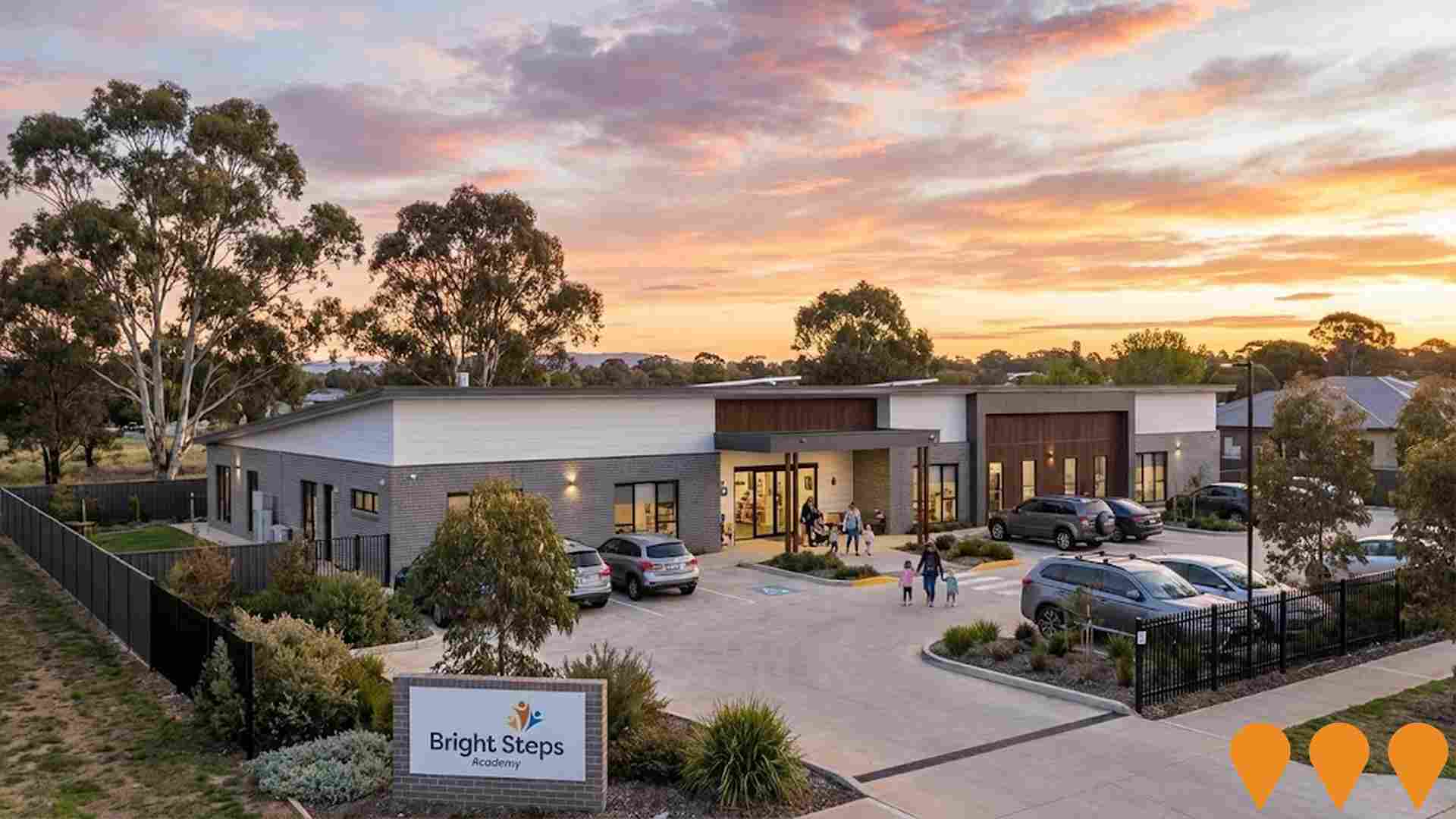
River Gum
Specialist Disability Accommodation featuring three one-bedroom villas designed for Robust and High Physical Support participants and an adjoining two-bedroom house for Improved Liveability participants. Features customized design elements including wide doorways, adjustable benches, private ensuite bathrooms with underfloor heating, assistive technology, and enhanced physical access provisions. The project represents Good Housing's first development outside Greater Sydney.
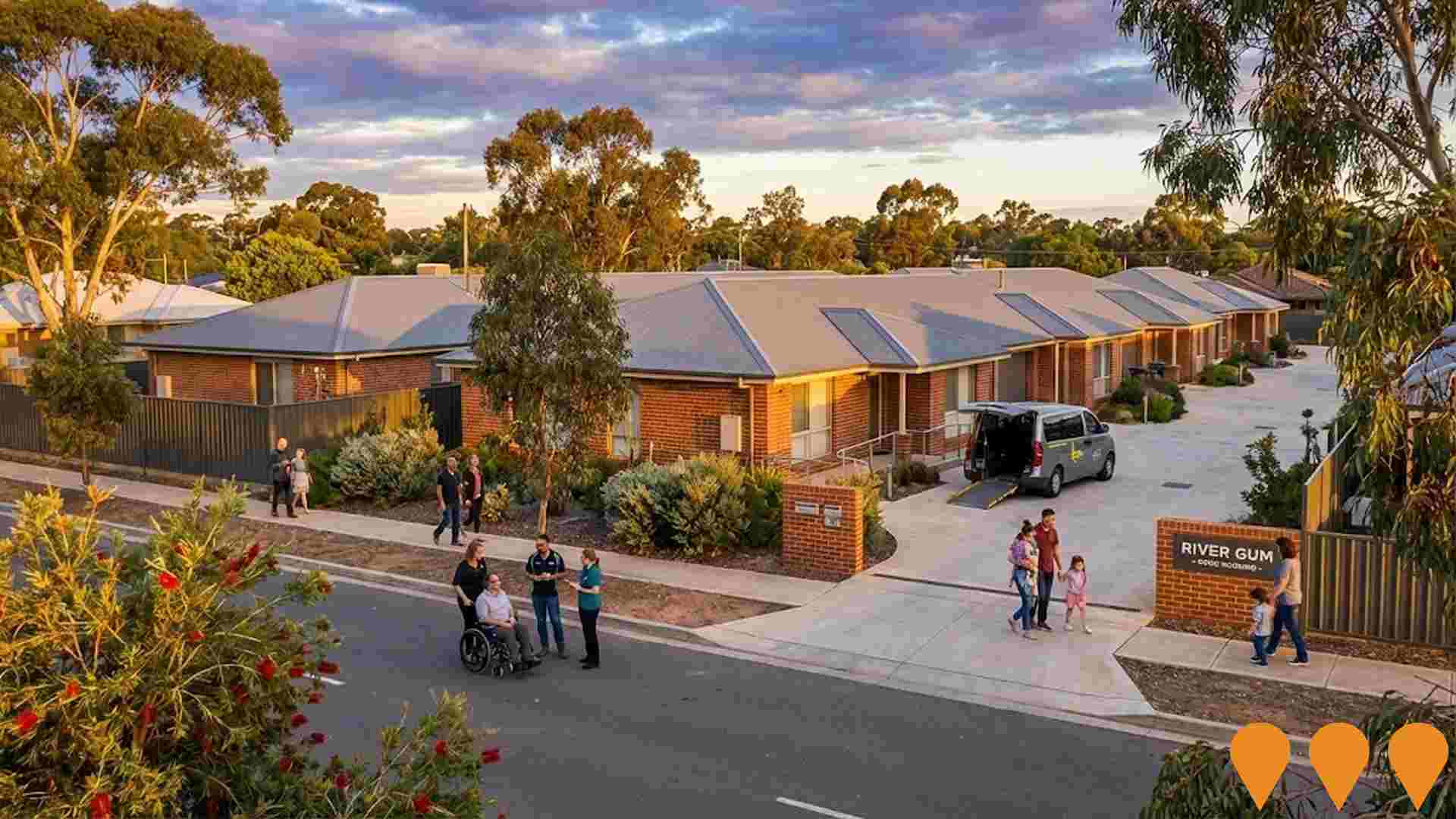
Lavington Place to Love
A public space activation trial transforming part of the Griffith Road car park into a community gathering space with ping pong table, benches, planter boxes, and shade sails. The six-month trial opened November 2024 with $150,000 NSW Government Places to Love program funding. Despite 83% community support, council deferred decision on permanent implementation in July 2025, exploring options including turf installation and ongoing maintenance versus returning to car park.
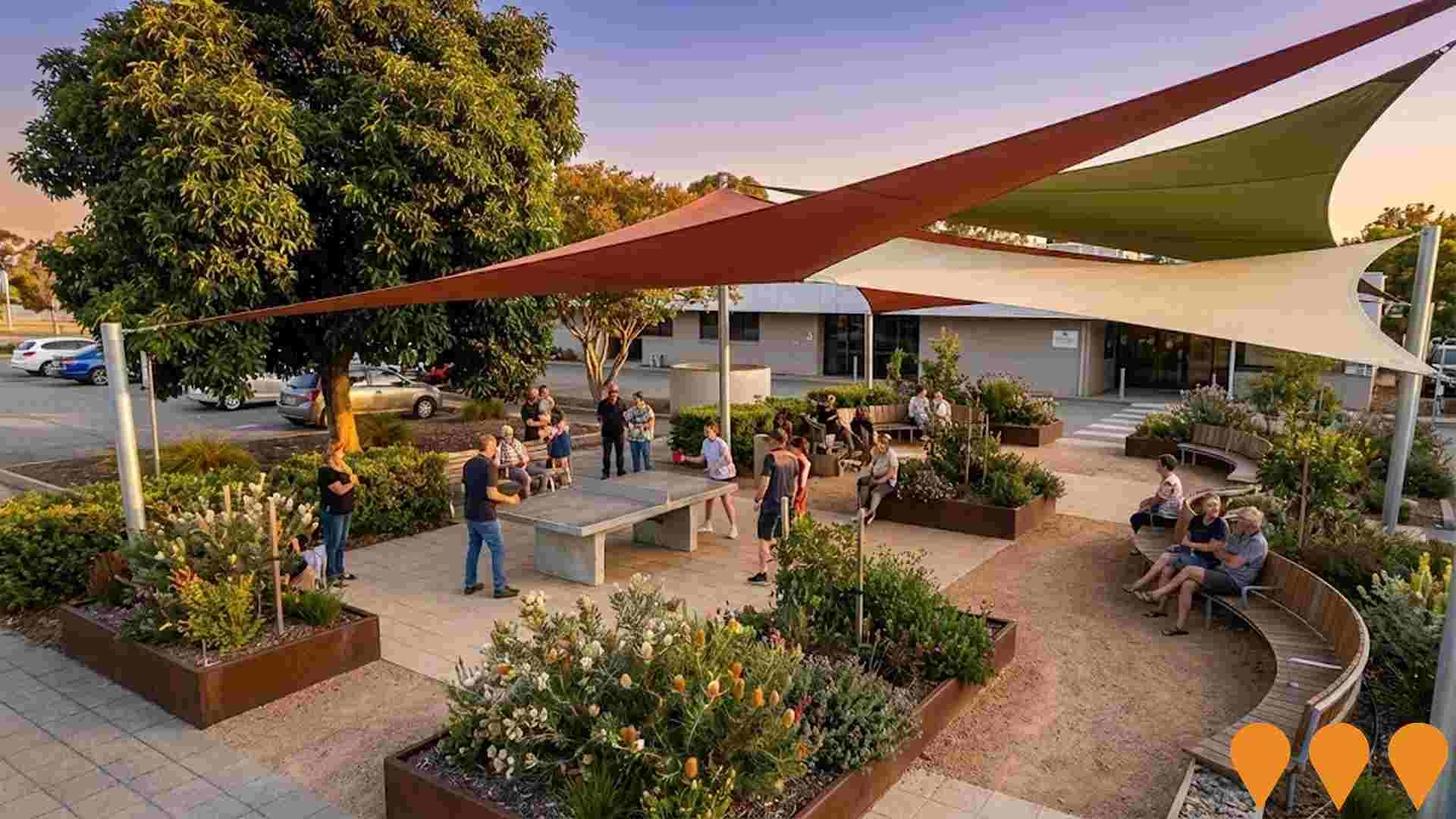
Employment
AreaSearch assessment indicates Albury - North faces employment challenges relative to the majority of Australian markets
Albury - North has a skilled workforce with essential services sectors well represented. As of September 2025, the unemployment rate is 6.2%.
The area has experienced relative employment stability over the past year. There are 5,740 residents employed, with an unemployment rate 2.4% higher than Rest of NSW's rate of 3.8%. Workforce participation is broadly similar to Rest of NSW at 56.4%. Key industries for residents include health care & social assistance, retail trade, and construction.
The area has a specialization in manufacturing, employing 1.6 times the regional level, while agriculture, forestry & fishing employs just 0.9% of local workers compared to Rest of NSW's 5.3%. Employment opportunities locally appear limited based on Census working population vs resident population data. Between September 2024 and September 2025, employment levels increased by 0.3%, labour force by 1.1%, leading to an unemployment rise of 0.8 percentage points. In contrast, Rest of NSW saw employment contract by 0.5%, labour force fall by 0.1%, and unemployment rise by 0.4 percentage points. State-level data from 25-Nov-25 shows NSW employment contracted by 0.03% (losing 2,260 jobs), with the state unemployment rate at 3.9%. Nationally, the unemployment rate is 4.3%. Jobs and Skills Australia's national employment forecasts for May-25 project a 6.6% increase over five years and 13.7% over ten years. Applying these projections to Albury - North's employment mix suggests local employment should increase by 6.3% over five years and 13.3% over ten years, based on simple weighting extrapolation for illustrative purposes.
Frequently Asked Questions - Employment
Income
Income levels sit below national averages according to AreaSearch assessment
AreaSearch's latest postcode level ATO data for financial year 2022 shows that Albury - North SA2 has a median income of $52,619 and an average income of $65,933. This is slightly above the national averages. Rest of NSW, meanwhile, has a median income of $49,459 and an average income of $62,998. Based on Wage Price Index growth of 12.61% since financial year 2022, current estimates for Albury - North would be approximately $59,254 (median) and $74,247 (average) as of September 2025. According to Census 2021 income data, household, family, and personal incomes in Albury - North rank modestly, between the 22nd and 33rd percentiles. The earnings profile shows that 31.1% of residents earn between $1,500 and $2,999 weekly, aligning with metropolitan regions where this cohort also represents 29.9%. After housing costs, 85.3% of income remains, ranking at the 24th percentile nationally.
Frequently Asked Questions - Income
Housing
Albury - North is characterized by a predominantly suburban housing profile, with a higher proportion of rental properties than the broader region
Albury - North's dwelling structures, as per the latest Census, consisted of 84.9% houses and 15.1% other dwellings (semi-detached, apartments, 'other' dwellings), compared to Non-Metro NSW's 83.2% houses and 16.8% other dwellings. Home ownership in Albury - North was at 30.9%, with mortgaged dwellings at 32.8% and rented ones at 36.2%. The median monthly mortgage repayment was $1,300, below Non-Metro NSW's average of $1,430. The median weekly rent was $268, similar to Non-Metro NSW's figure of $265. Nationally, Albury - North's mortgage repayments were significantly lower than the Australian average of $1,863, and rents were substantially below the national figure of $375.
Frequently Asked Questions - Housing
Household Composition
Albury - North features high concentrations of lone person households, with a lower-than-average median household size
Family households comprise 64.5% of all households, including 22.8% couples with children, 25.8% couples without children, and 14.7% single parent families. Non-family households account for the remaining 35.5%, with lone person households at 31.5% and group households comprising 3.8%. The median household size is 2.3 people, which is smaller than the Rest of NSW average of 2.4.
Frequently Asked Questions - Households
Local Schools & Education
Educational outcomes in Albury - North fall within the lower quartile nationally, indicating opportunities for improvement in qualification attainment
The area's university qualification rate is 18.2%, significantly lower than the NSW average of 32.2%. Bachelor degrees are most common at 12.4%, followed by postgraduate qualifications (3.2%) and graduate diplomas (2.6%). Vocational credentials are prevalent, with 40.2% of residents aged 15+ holding them, including advanced diplomas (10.3%) and certificates (29.9%). Educational participation is high at 29.9%, comprising primary education (10.3%), secondary education (8.3%), and tertiary education (3.1%).
Educational participation is notably high, with 29.9% of residents currently enrolled in formal education. This includes 10.3% in primary education, 8.3% in secondary education, and 3.1% pursuing tertiary education.
Frequently Asked Questions - Education
Schools Detail
Nearby Services & Amenities
Transport
Transport servicing is moderate compared to other areas nationally based on assessment of service frequency, route connectivity and accessibility
Albury - North has 173 active public transport stops serving a mix of bus routes. These stops are covered by 65 individual routes, offering a total of 1,208 weekly passenger trips. The average distance to the nearest stop for residents is 157 meters, indicating excellent accessibility.
On average, there are 172 trips per day across all routes, translating to approximately six weekly trips per stop.
Frequently Asked Questions - Transport
Transport Stops Detail
Health
Health performance in Albury - North is well below average with prevalence of common health conditions notable across both younger and older age cohorts
Albury - North faces substantial health challenges, with common conditions prevalent across younger and older age groups.
The area has private health cover at approximately 52% of its total population (~5,673 people), slightly higher than the average SA2 area. Mental health issues affect 11.4% of residents, while asthma impacts 9.5%. A total of 61.6% declare themselves completely clear of medical ailments, compared to 64.2% across Rest of NSW. The area has 20.3% of residents aged 65 and over (2,198 people). Health outcomes among seniors present some challenges, performing even better than the general population in health metrics.
Frequently Asked Questions - Health
Cultural Diversity
Albury - North ranks below the Australian average when compared to other local markets across a number of language and cultural background related metrics
Albury-North has a population with low cultural diversity, as indicated by the high percentages of citizens (87.7%), Australian-born individuals (87.8%), and English-only speakers at home (91.4%). Christianity is the predominant religion in Albury-North, practiced by 51.0% of its residents. Notably, the 'Other' religious category is overrepresented in Albury-North compared to the rest of NSW, with 2.0% versus 1.4%.
The top three ancestry groups in Albury-North are English (29.5%), Australian (28.9%), and Irish (9.5%). There are also notable differences in the representation of certain ethnic groups: German is slightly overrepresented at 5.8%, Australian Aboriginal is higher at 3.5% compared to regional averages, and Hungarian is somewhat more prevalent at 0.3%.
Frequently Asked Questions - Diversity
Age
Albury - North's population aligns closely with national norms in age terms
The median age in Albury - North is 39 years, which is significantly lower than Rest of NSW's average of 43 but essentially aligned with Australia's median age of 38 years. Compared to Rest of NSW, Albury - North has a higher proportion of residents aged 25-34 (14.2%) but fewer residents aged 65-74 (11.0%). According to the 2021 Census, the 25 to 34 age group increased from 13.1% to 14.2% of Albury - North's population, while the 45 to 54 cohort decreased from 12.7% to 11.1%. By 2041, demographic projections indicate significant shifts in Albury - North's age structure. Notably, the 25 to 34 group is projected to grow by 41%, reaching 2,156 people from 1,534. Conversely, the 55 to 64 cohort is expected to grow by a modest 0%, with an increase of just 6 people.
